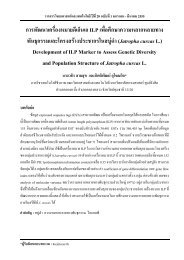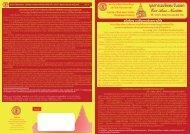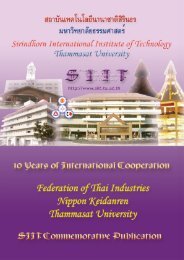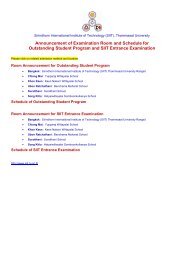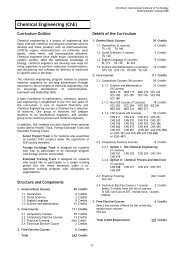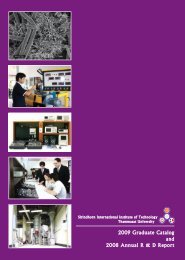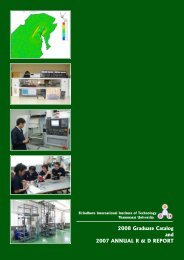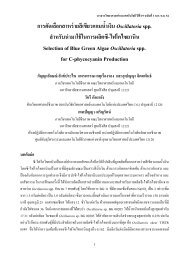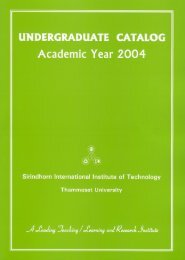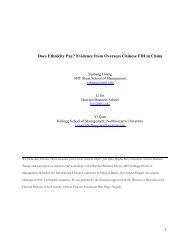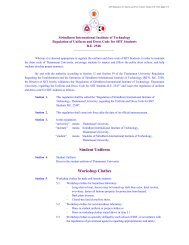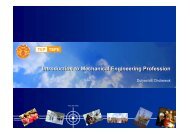Undergraduate Catalog, Academic Year 2011 - Sirindhorn ...
Undergraduate Catalog, Academic Year 2011 - Sirindhorn ...
Undergraduate Catalog, Academic Year 2011 - Sirindhorn ...
You also want an ePaper? Increase the reach of your titles
YUMPU automatically turns print PDFs into web optimized ePapers that Google loves.
<strong>Sirindhorn</strong> International Institute of Technology<br />
<strong>Undergraduate</strong> <strong>Catalog</strong> <strong>2011</strong><br />
Emphases are placed on first-order ordinary differential<br />
equations; linear ordinary differential equations of<br />
higher order; power series representation and gamma<br />
functions; Laplace and inverse transform methods;<br />
mathematical modeling, computers, and error analysis;<br />
fundamentals of unconstrained and constrained<br />
optimizations such as golden-section search, quadratic<br />
interpolation, gradient methods, and linear<br />
programming; least-squares regression; interpolation.<br />
Some heuristic algorithms such as Simulated Annealing,<br />
Particle Swarm Optimization, etc., will also be<br />
introduced. The implementation of these techniques<br />
using mathematical software packages, e.g., MATLAB<br />
and/or LINGO, for Industrial Engineering applications will<br />
also be covered.<br />
IES 301 Manufacturing Tools and 3(2-3-4)<br />
Operations<br />
Prerequisite: None<br />
This course emphasizes fundamentals of engineering and<br />
measurement, particularly the correct and safe use of<br />
machine tools. Students are provided with hands-on<br />
experience in fitting, welding, foundry, and fabrication.<br />
IES 302 Engineering Statistics 3(3-1-5)<br />
Prerequisite: MAS 117 or GTS 117 or<br />
consent of Head of School<br />
This course discusses fundamentals of probability,<br />
discrete and continuous probability distributions,<br />
conditional probability, moment generating functions,<br />
discrete and continuous random variables, sampling<br />
distributions, hypothesis testings of the means,<br />
variances, and proportions. Regression analysis will also<br />
be introduced.<br />
IES 303 Engineering Management and 3(3-0-6)<br />
Cost Analysis<br />
(For non-industrial engineering students)<br />
Prerequisite: None<br />
The course presents a broad and fundamental view of<br />
management systems (in both classical and modern<br />
aspects), including structures and functions of<br />
interrelated departments. Philosophy and quantitative<br />
aspects of inventory management, quality assurance,<br />
project management, etc. are emphasized. Students are<br />
also introduced to basic concepts and applications of an<br />
economic evaluation of engineering projects. Topics<br />
covered include interest formulas, time value of money,<br />
economic decision making involving several alternatives,<br />
etc. This course is not intended for industrial engineering<br />
students.<br />
IES 304 Industrial Engineering Training 0(0-0-0)<br />
Prerequisite: Junior standing<br />
Students are provided with on-the-job training at<br />
selected modern industrial or service facilities. The<br />
purpose of the course is to allow the students<br />
opportunities to observe how industrial engineers<br />
function, to learn how to collaborate with co-workers,<br />
and to develop self-responsibility. The training period<br />
must not be less than 240 hours. Students must submit a<br />
report at the end of the training period. Satisfactory (S)<br />
or unsatisfactory (U) grade will be given based on<br />
student’s performance, quality of the report, and<br />
supervisor’s comments.<br />
IES 305 Senior Project I 1(0-3-0)<br />
Prerequisite: Senior standing or<br />
consent of Head of School<br />
The first course in the senior project course series. A<br />
student team will be given a real world problem which<br />
they must determine appropriate approaches and actions<br />
to obtain feasible solutions. This involves establishment<br />
of initial contacts, project proposal development,<br />
preliminary data collection, data analysis, verification of<br />
the results, and practical implementation. A<br />
presentation of the progress and a submission of the<br />
status report are due at the end of the semester.<br />
IES 307 Independent Studies in Industrial 3(0-9-0)<br />
Engineering<br />
Prerequisite: None<br />
This course is specifically intended for qualified students<br />
who aim to pursue a graduate degree in industrial<br />
engineering or related fields. Students will learn to<br />
develop research skills by participating in on-going<br />
research projects conducted by faculty members. They<br />
will be involved in the literature search, design of an<br />
experiment, data collection and analysis, and the<br />
preparation of a technical report, through close<br />
supervision from responsible faculty.<br />
IES 308 Engineering Tools and Operations 2(1-3-2)<br />
(For non-industrial and non-mechanical<br />
engineering students)<br />
Prerequisite: None<br />
This course emphasizes safe uses of engineering tools<br />
and fundamentals of machining, fitting, and welding<br />
operation. Students are provided with experience in<br />
benchworking, welding, etc.<br />
IES 311 Ergonomics 3(3-0-6)<br />
Prerequisite: None<br />
The course emphasizes human-machine-environment<br />
systems, workplace layout, tool design, occupational<br />
fatigue, environmental effects on human performance<br />
which include the effects of noise, vibration, and<br />
atmospheric factors. Participation in supervised<br />
experiments or a completion of a semester project under<br />
instructor’s supervision is mandatory.<br />
IES 312 Methods Analysis and Work 3(3-0-6)<br />
Measurement<br />
Prerequisite: None<br />
This course emphasizes the measurement and evaluation<br />
of work methods and how improvement can be<br />
introduced. Topics include visual and micromotion study<br />
techniques, motion economy, time study, and work<br />
sampling. The development and use of standard time<br />
data and computerized techniques will be covered.<br />
IES 313 Industrial Plant Design 3(3-0-6)<br />
Prerequisite: None<br />
Modern methods applied to facility layout and location<br />
design are discussed. Logistics of motion of people and<br />
materials, flow analysis, plant layout, and material<br />
handling techniques are covered. Students will study the<br />
mathematical approaches and computer packages<br />
applicable for solving facility layout and location<br />
problems.<br />
52




